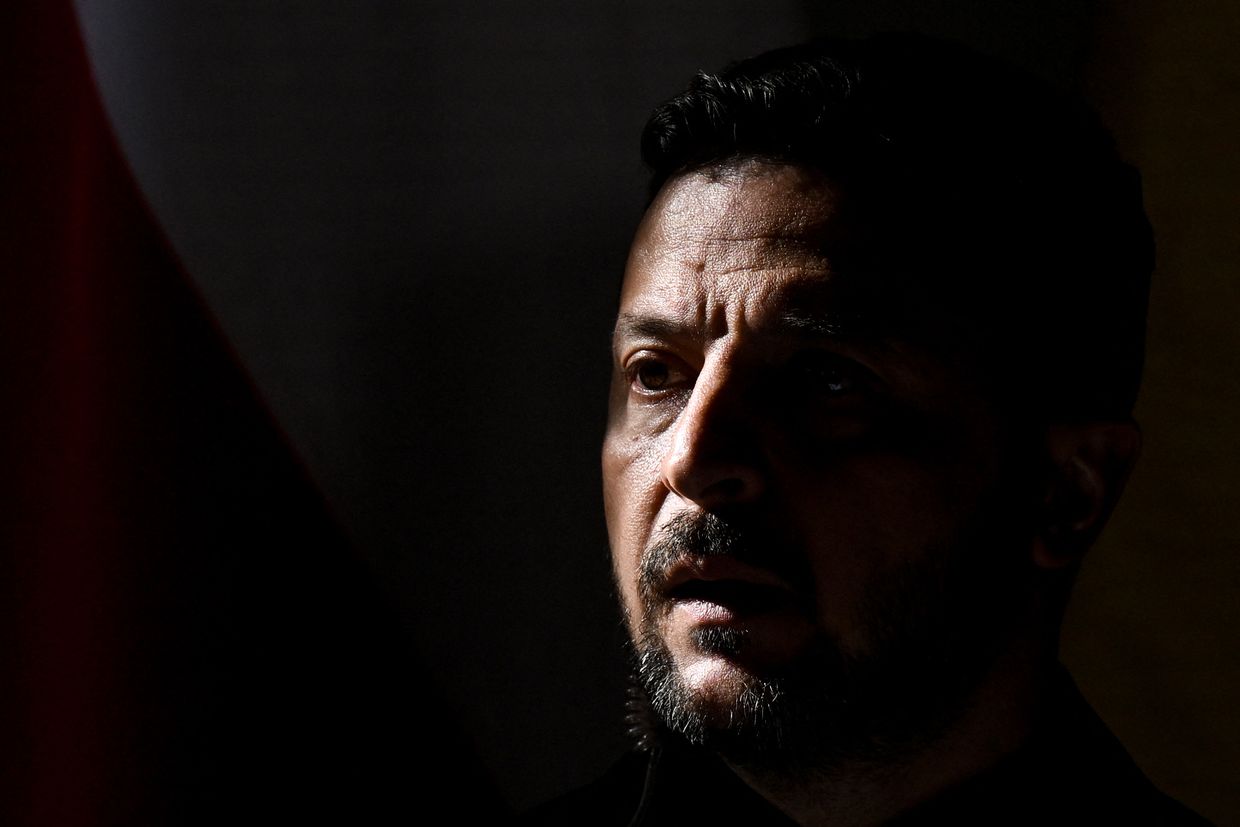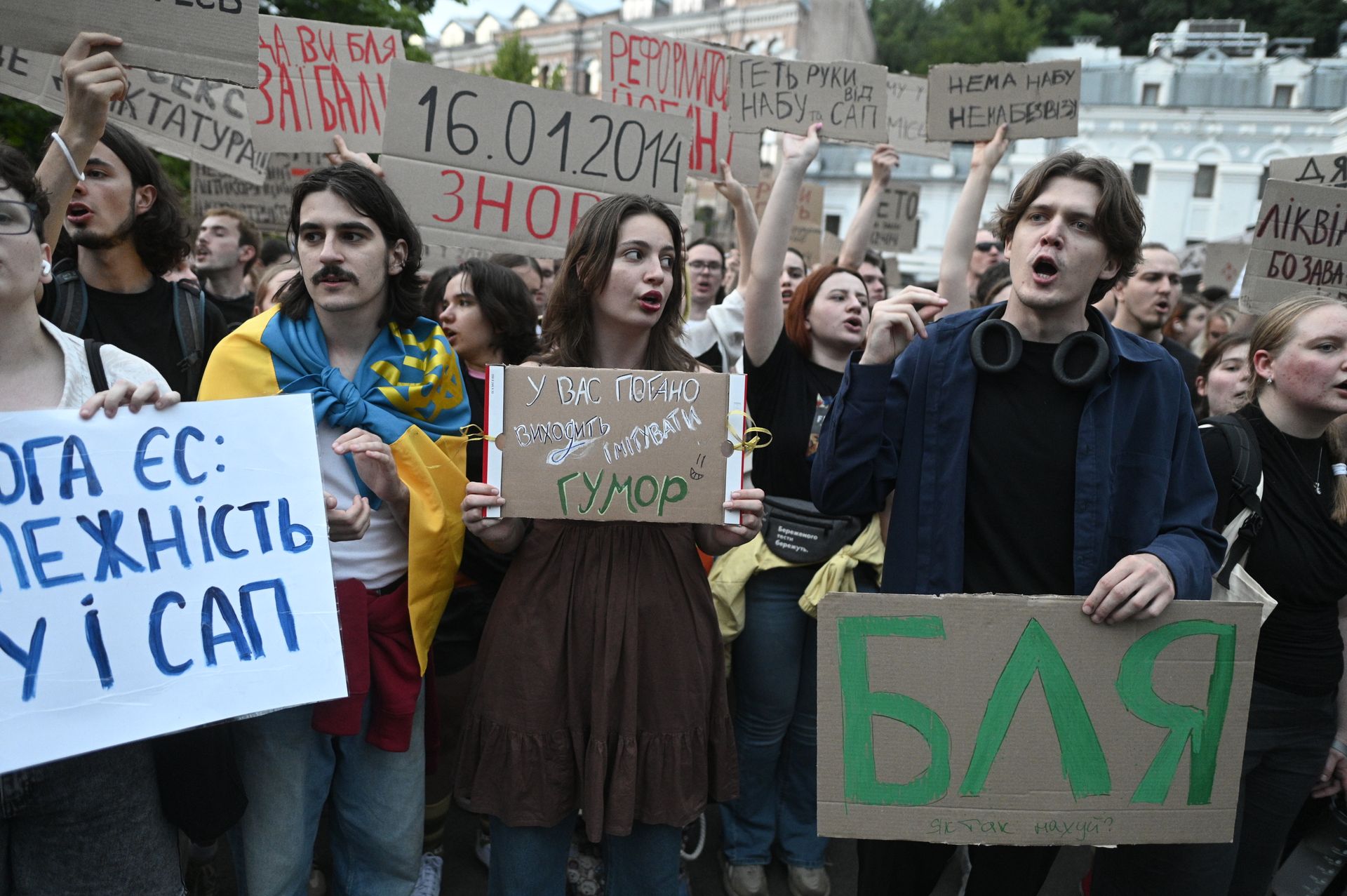UPDATE: Zelensky signs law destroying independence of Ukraine's key anti-corruption bodies

Editor's note: This is a developing story and is being updated.
President Volodymyr Zelensky on July 22 signed into law a bill that effectively destroys the independence of Ukraine's two key anti-corruption institutions, according to opposition lawmakers and watchdogs.
Earlier in the day, the Ukrainian parliament (Verkhovna Rada) approved amendments that grant the prosecutor general new powers over investigations led by the National Anti-Corruption Bureau of Ukraine (NABU) and cases led by the Specialized Anti-Corruption Prosecutor's Office (SAPO).
The step comes as Ukrainian authorities ramp up pressure against the two agencies established as part of the anti-graft reforms after the EuroMaidan Revolution.
The bill was passed with the support of 263 lawmakers, with 13 voting against it and 13 abstaining. As the legislation made its way to Zelensky's desk for his approval or veto, protestors gathered in Kyiv and other major cities across the country to demand the president veto the law.
The protests were still underway when Zelensky signed the bill.
The law has already been published on Holos Ukrayini (Voice of Ukraine), a Ukrainian newspaper that publishes laws passed by parliament when they enter into force the following day. Protests continued into the night as the law officially entered into force on July 23.
Under the new bill, the prosecutor general has the authority to issue directions in NABU's investigations — or even reassign them outside the agency. It would also allow the prosecutor general to delegate SAPO's powers to other prosecutors.
Among other new powers, the prosecutor general could also close NABU's investigations at the legal defense's request.
In a video address delivered after midnight on July 23, Zelensky said he had met with the heads of NABU, SAPO, the Security Service of Ukraine (SBU), and Prosecutor General Ruslan Kravchenko.
"The anti-corruption infrastructure will work. Only without Russian influence — everything needs to be cleansed of this. And there must be more justice," Zelensky said.
"Of course, NABU and SAPO will keep working. And it is important that the Prosecutor General is determined to ensure that in Ukraine the inevitability of punishment for those who go against the law is really ensured. And this is what is really needed for Ukraine. Cases that have been pending must be investigated."
The president did not directly address the demonstrations, but noted that it had been an "emotional" day.
Ruslan Kravchenko, appointed as Ukraine's prosecutor general last month, has been described by experts as a figure close to President Volodymyr Zelensky.
Watchdogs have warned that if adopted, the amendments would hamper the two agencies' investigations into authorities or individuals close to the president.
The changes would amount to the "destruction of NABU and SAPO's independence and practically subordinate their activities to the prosecutor general," NABU said in a statement ahead of the vote.
"Ukraine's anti-corruption infrastructure, built since 2015, will be destroyed," the agency added.
NABU Director Semen Kryvonos condemned the legislation, saying it threatens Ukraine's Euro-Atlantic integration. Speaking at a press conference after the vote, he voiced hopes that Zelensky would veto it.
"This is effectively the end of the work of two independent institutions," said Oleksandr Klymenko, head of SAPO, during the press conference.
Anastasiia Radina, head of the anti-corruption parliamentary committee, was reportedly the only lawmaker from the ruling Servant of the People parliamentary group to publicly speak out against the legislation ahead of the vote.
"I ask you, colleagues, not to deceive yourselves and the people that you are voting for some mild strengthening of the prosecutor general, and not for the dismantling of NABU and SAPO," she said.
"After the amendments that the committee added to this bill today, contrary to the rules, the anti-corruption prosecutor's office becomes a fiction for budget funds."
The amendment bill was pushed through with unusual speed, as it was cleared by the committee, passed by the legislature, and signed by Speaker Ruslan Stefanchuk, all in a single day.
The news comes amid mounting warnings from activists about an escalating crackdown on anti-corruption bodies and NGOs.
On July 21, several law enforcement agencies — including the Prosecutor General's Office, the Security Service of Ukraine (SBU), and the State Bureau of Investigation — carried out sweeping searches of NABU and SAPO.
Fifteen NABU employees are under investigation on various grounds. The SBU justified the raids by citing suspected Russian infiltration and administrative misconduct, with allegations ranging from traffic violations to treason.
One NABU employee was detained on charges of spying for Russia, while another is accused of involvement in drug trafficking and ties to pro-Russian groups.
Speaking at the press conference on July 22, Kryvonos said that law enforcement agents used "excessive physical force" during the raids. This left three NABU employees — who were not detained — injured and in need of medical attention, he noted.
Earlier this month, the State Bureau of Investigation charged Vitaliy Shabunin, Ukraine's leading anti-corruption activist and co-founder of the Anti-Corruption Action Center, with fraud and evasion of military service, a charge he denies.
The crackdown on Ukraine's anti-corruption sector has also sparked concern among Kyiv's international partners.
"The European Union is concerned about Ukraine's recent actions with regard to its anti-corruption institutions, NABU and SAPO. These institutions are crucial to Ukraine's reform agenda and must operate independently to fight corruption and maintain public trust," EU Commission spokesperson Guillaume Mercier said.
"The EU provides significant financial assistance to Ukraine, conditional on progress in transparency, judicial reform, and democratic governance. Ukraine's EU accession will require a strong capacity to combat corruption and to ensure institutional resilience."
European Commissioner for Enlargement Marta Kos expressed "serious concern" over the parliament's adoption of the bill.
"The dismantling of key safeguards protecting NABU's independence is a serious step back," Kos wrote on X. "Independent bodies like NABU and SAPO, are essential for Ukraine's EU path. Rule of Law remains in the very center of EU accession negotiations."

















